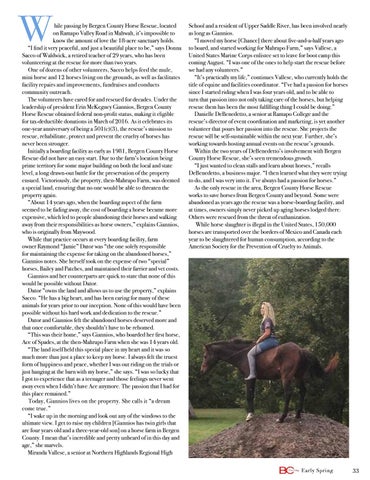W
hile passing by Bergen County Horse Rescue, located on Ramapo Valley Road in Mahwah, it’s impossible to know the amount of love the 18-acre sanctuary holds. “I find it very peaceful, and just a beautiful place to be,” says Donna Sacco of Waldwick, a retired teacher of 29 years, who has been volunteering at the rescue for more than two years. One of dozens of other volunteers, Sacco helps feed the mule, mini horse and 12 horses living on the grounds, as well as facilitates facility repairs and improvements, fundraises and conducts community outreach. The volunteers have cared for and rescued for decades. Under the leadership of president Erin McKegney Giannios, Bergen County Horse Rescue obtained federal non-profit status, making it eligible for tax-deductible donations in March of 2016. As it celebrates its one-year anniversary of being a 501(c)(3), the rescue’s mission to rescue, rehabilitate, protect and prevent the cruelty of horses has never been stronger. Initially a boarding facility as early as 1981, Bergen County Horse Rescue did not have an easy start. Due to the farm’s location being prime territory for some major building on both the local and state level, a long drawn-out battle for the preservation of the property ensued. Victoriously, the property, then-Mahrapo Farm, was deemed a special land, ensuring that no one would be able to threaten the property again. “About 14 years ago, when the boarding aspect of the farm seemed to be fading away, the cost of boarding a horse became more expensive, which led to people abandoning their horses and walking away from their responsibilities as horse owners,” explains Giannios, who is originally from Maywood. While that practice occurs at every boarding facility, farm owner Raymond “Jamie” Dator was “the one solely responsible for maintaining the expense for taking on the abandoned horses,” Giannios notes. She herself took on the expense of two “special” horses, Bailey and Patches, and maintained their farrier and vet costs. Giannios and her counterparts are quick to state that none of this would be possible without Dator. Dator “owns the land and allows us to use the property,” explains Sacco. “He has a big heart, and has been caring for many of these animals for years prior to our inception. None of this would have been possible without his hard work and dedication to the rescue.” Dator and Giannios felt the abandoned horses deserved more and that once comfortable, they shouldn’t have to be rehomed. “This was their home,” says Giannios, who boarded her first horse, Ace of Spades, at the then-Mahrapo Farm when she was 14 years old. “The land itself held this special place in my heart and it was so much more than just a place to keep my horse. I always felt the truest form of happiness and peace, whether I was out riding on the trials or just hanging at the barn with my horse,” she says. “I was so lucky that I got to experience that as a teenager and those feelings never went away even when I didn’t have Ace anymore. The passion that I had for this place remained.” Today, Giannios lives on the property. She calls it “a dream come true.” “I wake up in the morning and look out any of the windows to the ultimate view. I get to raise my children [Giannios has twin girls that are four years old and a three-year-old son] on a horse farm in Bergen County. I mean that’s incredible and pretty unheard of in this day and age,” she marvels. Miranda Vallese, a senior at Northern Highlands Regional High
School and a resident of Upper Saddle River, has been involved nearly as long as Giannios. “I moved my horse [Chance] there about five-and-a-half years ago to board, and started working for Mahrapo Farm,” says Vallese, a United States Marine Corps enlistee set to leave for boot camp this coming August. “I was one of the ones to help start the rescue before we had any volunteers.” “It’s practically my life,” continues Vallese, who currently holds the title of equine and facilities coordinator. “I’ve had a passion for horses since I started riding when I was four years old, and to be able to turn that passion into not only taking care of the horses, but helping rescue them has been the most fulfilling thing I could be doing.” Danielle DeBenedetto, a senior at Ramapo College and the rescue’s director of event coordination and marketing, is yet another volunteer that pours her passion into the rescue. She projects the rescue will be self-sustainable within the next year. Further, she’s working towards hosting annual events on the rescue’s grounds. Within the two years of DeBenedetto’s involvement with Bergen County Horse Rescue, she’s seen tremendous growth. “I just wanted to clean stalls and learn about horses,” recalls DeBenedetto, a business major. “I then learned what they were trying to do, and I was very into it. I’ve always had a passion for horses.” As the only rescue in the area, Bergen County Horse Rescue works to save horses from Bergen County and beyond. Some were abandoned as years ago the rescue was a horse-boarding facility, and at times, owners simply never picked up aging horses lodged there. Others were rescued from the threat of euthanization. While horse slaughter is illegal in the United States, 150,000 horses are transported over the borders of Mexico and Canada each year to be slaughtered for human consumption, according to the American Society for the Prevention of Cruelty to Animals.
Early Spring
33
